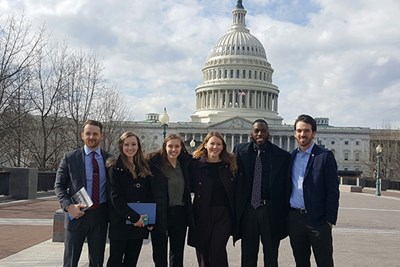Neil Shortland Wins $531,000 Grant for Study
 Image by Tory Wesnofske
Image by Tory Wesnofske
07/07/2017
By Katharine Webster
Fight, flight or freeze – those are the most common responses to high-stakes decisions made under stress.
Most of the time, soldiers quickly choose fight or flight, practically without thinking about it, says Neil Shortland, a visiting lecturer and program manager for the Center for Terrorism and Security Studies.
But when faced with two equally bad or uncertain choices, soldiers, police and other emergency responders may freeze, Shortland says.
“You can be so focused on not making the wrong choice that you don’t make any choice,” he says.
Now Shortland has won a three-year, $531,000 grant from the U.S. Army Research Institute to study military decision-making, working with the HEROES center on campus, the Army Natick Soldier Research and Development Center and colleagues from the University of Liverpool and Tufts University.
The study will compare military to nonmilitary decision-making in situations that call for a quick choice between two equally bad or uncertain alternatives, known as “least-worst” decision-making. A typical example: Armed insurgents set off a bomb in a tunnel where soldiers are trapped. Do you send in more soldiers to treat and evacuate the wounded? Or do you hold off, knowing that the insurgents could set off a second bomb to kill the rescuers?
The researchers will focus in particular on indecision, known in psychological terms as “decisional inertia,” as well as what leads to it and how training might help reduce it.
Shortland already has some ideas. A forensic psychologist, he started research in this area several years ago. First, he interviewed about 30 soldiers and veterans, asking each one to describe in detail a “least-worst” decision he or she had to make during wartime.
He used their examples to create immersive scenarios – brief podcasts with sound effects, followed by questions – that he could use with research subjects. Then he did a pilot study comparing 35 active-duty soldiers and veterans with 35 police officers (none of them military veterans) and 35 UMass Lowell students.
“Both soldiers and police officers make phenomenally hard choices under terrible circumstances and terrible stress,” he says. “But overall, the soldiers were faster and more confident than the police or the students.”
Shortland’s research suggests that soldiers may find it easier to make least-worst decisions because they have a very clear and strong hierarchy of values: namely, that protecting their fellow soldiers takes priority over everything else.
Police, who are generally dealing with civilians instead of an organized and well-armed enemy, operate within a more complex set of values. When confronted with a situation that requires them to choose between equally strong values, such as the imperative to protect civilians versus the need to protect fellow officers, they may hesitate.
That has implications for training, says Shortland, who is increasingly involved in training police and domestic security agencies.
“When people are better at identifying a single goal, they make better decisions,” he said.
In the new study, Shortland and his colleagues – Prof. Laurence Alison, director of the Centre for Critical and Major Incident Psychology at the University of Liverpool and Psychology Prof. Holly Taylor at Tufts University – will broaden the investigation to study more soldiers and civilians, measuring their psychological, neurological and physical processes at critical decision points.
Shortland’s doctoral dissertation on the earlier research earned him the American Psychological Association’s Society for Military Psychology research award, which he will accept at the society’s annual meeting in August. He’s the first non-American to win it.
Shortland is also coming out with a book, co-authored with Alison and Joe Moran, a senior cognitive scientist at Harvard and the Natick Soldier Research and Development Center, who will also help in the new study. “Conflict: How Soldiers Make Impossible Decisions” will be published by Oxford University Press next year.




